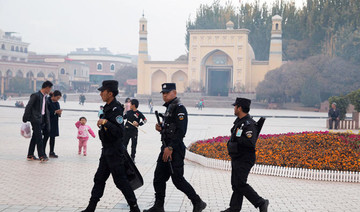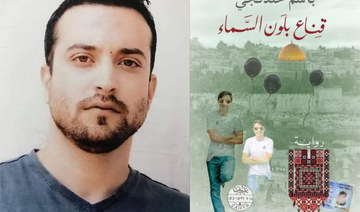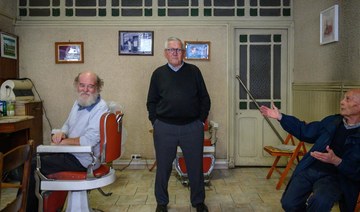PRISTINA: There’s a widespread tradition among many Muslims that it’s better for women to pray at home than in the mosque. But in Kosovo, an old Ottoman-era tradition is bucking that trend, with religious authorities seeking to establish the training of women as spiritual teachers in mosques.
Each day, scores of women gather around Agime Sogojeva, a spiritual teacher known as a mualime, in the Haxhi Veseli mosque in Kosovo’s northern town of Mitrovica. They discuss the Qur’an, their rights as women and daily practices, in a scene unthinkable as little as a decade ago.
Sogojeva is one of some 100 female theologians aiming to revive Muslim traditions in Europe’s newest country. They teach at three Muslim high schools, at Muslim centers, or they work voluntarily.
The move to establish the religious training of women in mosques — where women are allocated places in a separate room from the men — is seen by some as a way to make Kosovo’s approach to Islam more gender-balanced at a time when many in the West view Islam as oppressive toward women.
Although in much of the Muslim world women teach other women, it is more common for that to occur at home or in event halls rather than in the mosques themselves. In some very conservative Islamic societies, women are generally distanced from mosques for social rather than religious reasons.
In Kosovo, there has been a significant increase in the number of women attending mosques in the past 20 years, said Besa Ismaili, a 43-year-old professor of English at the Faculty of Islamic Studies in Pristina.
“The women were not only denied access, but their contribution was not recognized sufficiently,” she said. “We try to break up those stereotypes, those misconceptions.”
Kosovo has a strongly patriarchal society but also a long secular tradition, with religious identity significantly weakened during decades of communist rule. Most of its ethnic Albanian majority population is Muslim, but religious expression was generally lax even after the fall of communism in the late 1980s. The country declared independence from Serbia in 2008, nearly a decade after a 1998-1999 war against Yugoslav forces by ethnic Albanian fighters.
Recently, however, it has seen a rise of religiously-inspired violent extremism, with more than 300 Kosovo citizens joining the Daesh group as foreign fighters in Iraq and Syria since 2012. A quarter of those were women and children, often forced to follow their husbands into the war zone. About 180 Kosovo citizens are still active with extremist groups in Syria and Iraq, and the women are held in camps.
But Kosovo authorities claim no citizen has joined a fundamentalist group over the past two years, a development partly attributed to the empowering of women through the creation of female Islamic teachers.
“Extreme nationalism becomes less present when Islam is explained to women,” Ismaili says.
Funding for about a dozen of the female theologians comes from Turkey’s Directorate of Religious Affairs, or Diyanet, which assists the Islamic Community of Kosovo, or BIK, the country’s executive for Muslims.
These female preachers are active members in about 800 mosques countrywide, said Resul Rexhepi, BIK secretary general, modernizing women’s life and increasing their role in society.
“Mualime are good for the whole society,” he said.
BIK officials claim that the introduction of the female Muslim preachers in the mosques has reduced sexual violence at home, assisted women who were raped during the war, helped mothers with their children’s education and increased the participation of women in voting in elections. There are no official figures to support such claims.
During the past decade or so some 1,100 girls have graduated from three Muslim high schools and 300 women from the Faculty of Islamic Studies.
Enisa Bekteshi, a 21-year old student, says it is easier for a female teacher to explain “some delicate issues a woman is reluctant to ask an imam, a man.”
Muslim preachers help Kosovo women learn, win their rights
Muslim preachers help Kosovo women learn, win their rights
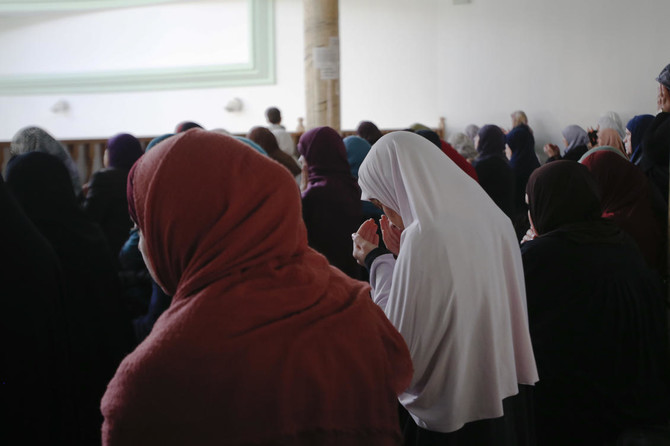
- In Kosovo, there has been a significant increase in the number of women attending mosques in the past 20 years
- But Kosovo authorities claim no citizen has joined a fundamentalist group over the past two years
A 98-year-old in Ukraine walked miles to safety from Russians, with slippers and a cane
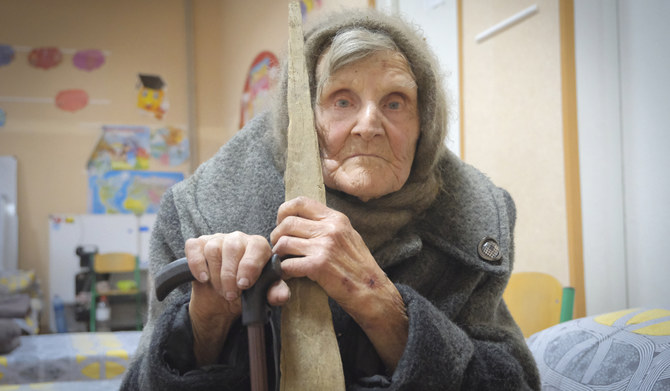
- Describing her journey, the nonagenarian said she had fallen twice and was forced to stop to rest at some points, even sleeping along the way before waking up and continuing her journey
KYIV, Ukraine: A 98-year-old woman in Ukraine who escaped Russian-occupied territory by walking almost 10 kilometers (6 miles) alone, wearing a pair of slippers and supported by a cane has been reunited with her family days after they were separated while fleeing to safety.
Lidia Stepanivna Lomikovska and her family decided to leave the frontline town of Ocheretyne, in the eastern Donetsk region, last week after Russian troops entered it and fighting intensified.
Russians have been advancing in the area, pounding Kyiv’s depleted, ammunition-deprived forces with artillery, drones and bombs.
“I woke up surrounded by shooting all around — so scary,” Lomikovska said in a video interview posted by the National Police of Donetsk region.
In the chaos of the departure, Lomikovska became separated from her son and two daughters-in-law, including one, Olha Lomikovska, injured by shrapnel days earlier. The younger family members took to back routes, but Lydia wanted to stay on the main road.
With a cane in one hand and steadying herself using a splintered piece of wood in the other, the pensioner walked all day without food and water to reach Ukrainian lines.
Describing her journey, the nonagenarian said she had fallen twice and was forced to stop to rest at some points, even sleeping along the way before waking up and continuing her journey.
“Once I lost balance and fell into weeds. I fell asleep … a little, and continued walking. And then, for the second time, again, I fell. But then I got up and thought to myself: “I need to keep walking, bit by bit,’” Lomikovska said.
Pavlo Diachenko, acting spokesman for the National Police of Ukraine in the Donetsk region, said Lomikovska was saved when Ukrainian soldiers spotted her walking along the road in the evening. They handed her over to the “White Angels,” a police group that evacuates citizens living on the front line, who then took her to a shelter for evacuees and contacted her relatives.
“I survived that war,’ she said referring to World War II. “I had to go through this war too, and in the end, I am left with nothing.
“That war wasn’t like this one. I saw that war. Not a single house burned down. But now – everything is on fire,” she said to her rescuer.
In the latest twist to the story, the chief executive of one of Ukraine’s largest banks announced on his Telegram channel Tuesday that the bank would purchase a house for the pensioner.
“Monobank will buy Lydia Stepanivna a house and she will surely live in it until the moment when this abomination disappears from our land,” Oleh Horokhovskyi said.
Amazon Purr-rime: Cat accidentally shipped to online retailer

- Galena was found safe by a warehouse worker at an Amazon center after vanishing from her home in Utah
LOS ANGELES: A curious cat that sneaked into an open box was shipped across the United States to an Amazon warehouse after its unknowing owners sealed it inside.
Carrie Clark’s pet, Galena, vanished from her Utah home on April 10, sparking a furious search that involved plastering “missing” posters around the neighborhood.
But a week later, a vet hundreds of miles (kilometers) away in Los Angeles got in touch to say the cat had been discovered in a box — alongside several pairs of boots — by a warehouse worker at an Amazon center.
“I ran to tell my husband that Galena was found and we broke down upon realizing that she must have jumped into an oversized box that we shipped out the previous Wednesday,” Clark told KSL TV in Salt Lake City.
“The box was a ‘try before you buy,’ and filled with steel-toed work boots.”
Clark and her husband jetted to Los Angeles, where they discovered Amazon employee Brandy Hunter had rescued Galena — a little hungry and thirsty after six days in a cardboard box, but otherwise unharmed.
“I could tell she belonged to someone by the way she was behaving,” said Hunter, according to Amazon.
“I took her home that night and went to the vet the next day to have her checked for a microchip, and the rest is history.”
What did people eat before agriculture? New study offers insight
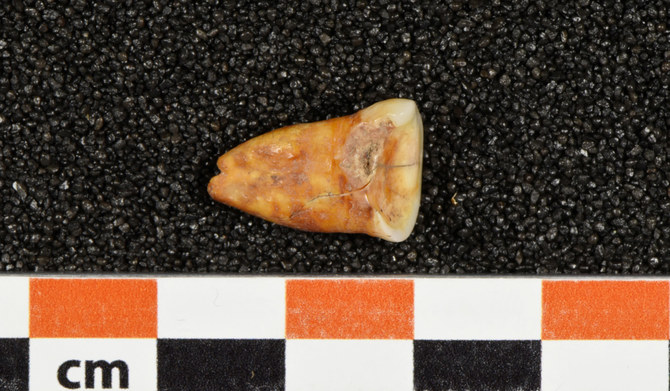
- Analysis of forms — or isotopes — of elements including carbon, nitrogen, zinc, sulfur and strontium in these remains indicated the type and amount of plants and meat they ate
WASHINGTON: The advent of agriculture roughly 11,500 years ago in the Middle East was a milestone for humankind — a revolution in diet and lifestyle that moved beyond the way hunter-gatherers had existed since Homo sapiens arose more than 300,000 years ago in Africa.
While the scarcity of well-preserved human remains from the period preceding this turning point has made the diet of pre-agricultural people a bit of a mystery, new research is now providing insight into this question. Scientists reconstructed the dietary practices of one such culture from North Africa, surprisingly documenting a heavily plant-based diet.
The researchers examined chemical signatures in bones and teeth from the remains of seven people, as well as various isolated teeth, from about 15,000 years ago found in a cave outside the village of Taforalt in northeastern Morocco. The people were part of what is called the Iberomaurusian culture.
Analysis of forms — or isotopes — of elements including carbon, nitrogen, zinc, sulfur and strontium in these remains indicated the type and amount of plants and meat they ate. Found at the site were remains from different edible wild plants including sweet acorns, pine nuts, pistachio, oats and legumes called pulses. The main prey, based on bones discovered at the cave, was a species called Barbary sheep.
“The prevailing notion has been that hunter-gatherers’ diets were primarily composed of animal proteins. However, the evidence from Taforalt demonstrates that plants constituted a big part of the hunter-gatherers’ menu,” said Zineb Moubtahij, a doctoral student in archaeology at the Max Planck Institute for Evolutionary Anthropology in Germany and lead author of the study published on Monday in the journal Nature Ecology & Evolution.
“It is important as it suggests that possibly several populations in the world already started to include substantial amount of plants in their diet” in the period before agriculture was developed, added archeogeochemist and study co-author Klervia Jaouen of the French research agency CNRS.
The Iberomaurusians were hunter-gatherers who inhabited parts of Morocco and Libya from around 25,000 to 11,000 years ago. Evidence indicates the cave served as a living space and burial site.
These people used the cave for significant portions of each year, suggesting a lifestyle more sedentary than simply roaming the landscape searching for resources, the researchers said. They exploited wild plants that ripened at different seasons of the year, while their dental cavities illustrated a reliance on starchy botanical species.
Edible plants may have been stored by the hunter-gatherers year-round to guard against seasonal shortages of prey and ensure a regular food supply, the researchers said.
These people ate only wild plants, the researchers found. The Iberomaurusians never developed agriculture, which came relatively late to North Africa.
“Interestingly, our findings showed minimal evidence of seafood or freshwater food consumption among these ancient groups. Additionally, it seems that these humans may have introduced wild plants into the diets of their infants at an earlier stage than previously believed,” Moubtahij said.
“Specifically, we focused on the transition from breastfeeding to solid foods in infants. Breast milk has a unique isotopic signature, distinct from the isotopic composition of solid foods typically consumed by adults.”
Two infants were among the seven people whose remains were studied. By comparing the chemical composition of an infant’s tooth, formed during the breastfeeding period, with the composition of bone tissue, which reflects the diet shortly before death, the researchers discerned changes in the baby’s diet over time. The evidence indicated the introduction of solid foods at around the age of 12 months, with babies weaned earlier than expected for a pre-agricultural society.
North Africa is a key region for studying Homo sapiens evolution and dispersal out of Africa.
“Understanding why some hunter-gatherer groups transitioned to agriculture while others did not can provide valuable insights into the drivers of agricultural innovation and the factors that influenced human societies’ decisions to adopt new subsistence strategies,” Moubtahij said.
Palestinian prisoner in Israel wins top fiction prize
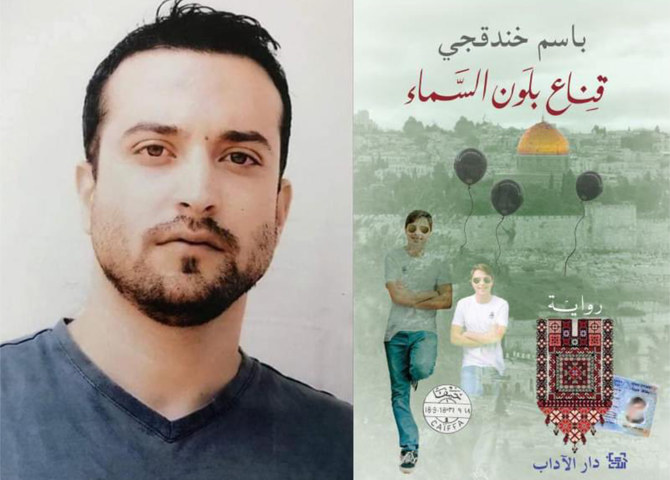
- The mask in the novel’s title refers to the blue identity card that Nur, an archaeologist living in a refugee camp in Ramallah, finds in the pocket of an old coat belonging to an Israeli
ABU DHABI: Palestinian writer Basim Khandaqji, jailed 20 years ago in Israel, won a prestigious prize for Arabic fiction on Sunday for his novel “A Mask, the Color of the Sky.”
The award of the 2024 International Prize for Arabic Fiction was announced at a ceremony in Abu Dhabi.
The prize was accepted on Khandaqji’s behalf by Rana Idriss, owner of Dar Al-Adab, the book’s Lebanon-based publisher.
Khandaqji was born in the Israeli-occupied West Bank city of Nablus in 1983, and wrote short stories until his arrest in 2004 at the age of 21.
He was convicted and jailed on charges relating to a deadly bombing in Tel Aviv, and completed his university education from inside jail via the Internet.
The mask in the novel’s title refers to the blue identity card that Nur, an archaeologist living in a refugee camp in Ramallah, finds in the pocket of an old coat belonging to an Israeli.
Khandaqji’s book was chosen from 133 works submitted to the competition.
Nabil Suleiman, who chaired the jury, said the novel “dissects a complex, bitter reality of family fragmentation, displacement, genocide, and racism.”
Since being jailed Khandaqji has written poetry collections including “Rituals of the First Time” and “The Breath of a Nocturnal Poem.”
He has also written three earlier novels.
Mexican doctor claims victory in $28 Cartier earrings battle

MEXICO CITY: A Mexican man has claimed a victory over French luxury brand Cartier, saying an error allowed him to buy two pairs of earrings for $28 that were supposed to cost nearly $28,000.
After a four-month struggle, doctor Rogelio Villarreal said he had finally received the jewelry, which he accused the company of refusing to deliver after his online purchase in December.
According to Villarreal, he came across the low-priced earrings while browsing Instagram.
“I swear I broke out in a cold sweat,” he wrote on the social media platform X.
Cartier declined to recognize the purchase and offered Villarreal a refund, as well as a bottle of champagne and a passport holder as compensation, according to a company letter shared by the doctor.
But Villarreal refused and decided to take the case to Mexico’s consumer protection agency, which ruled in favor of the doctor.
Cartier accepted the decision, Villarreal announced.
“War is over. Cartier is complying,” he wrote.



